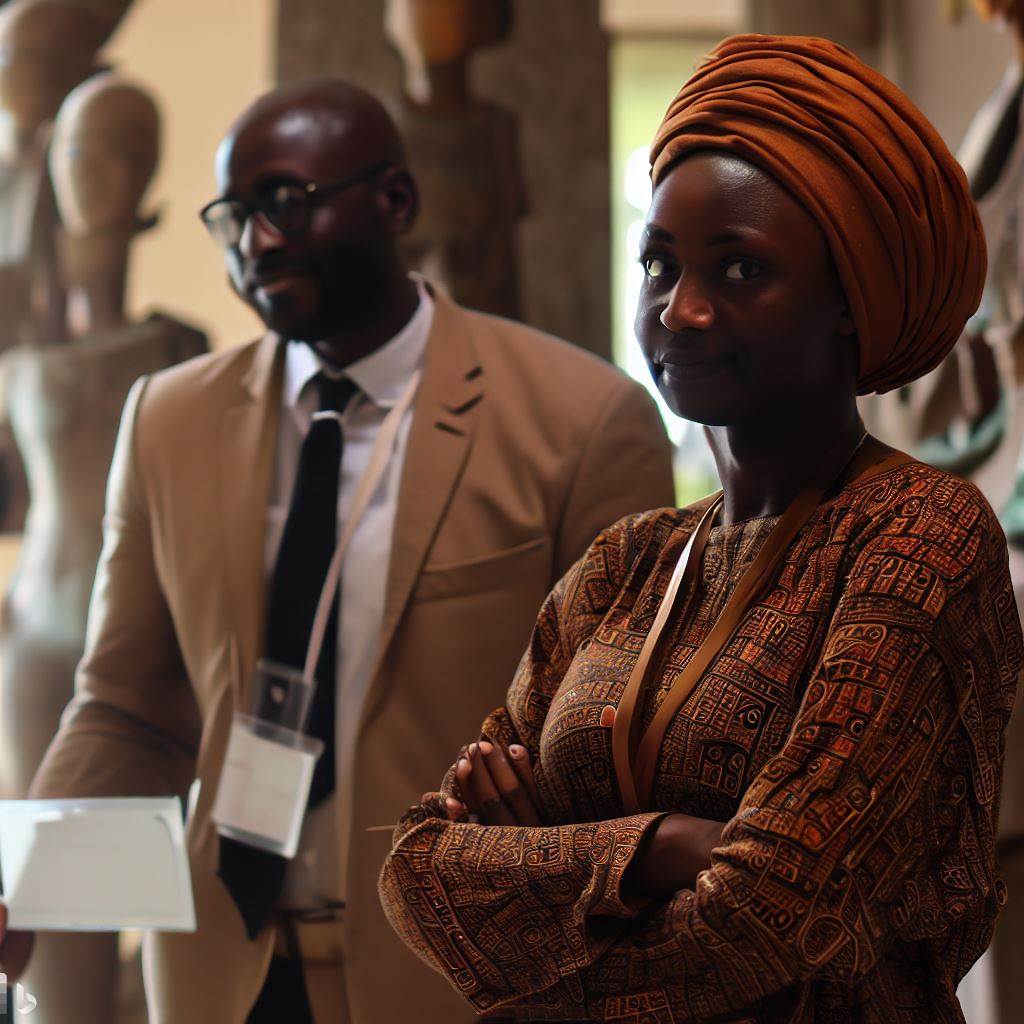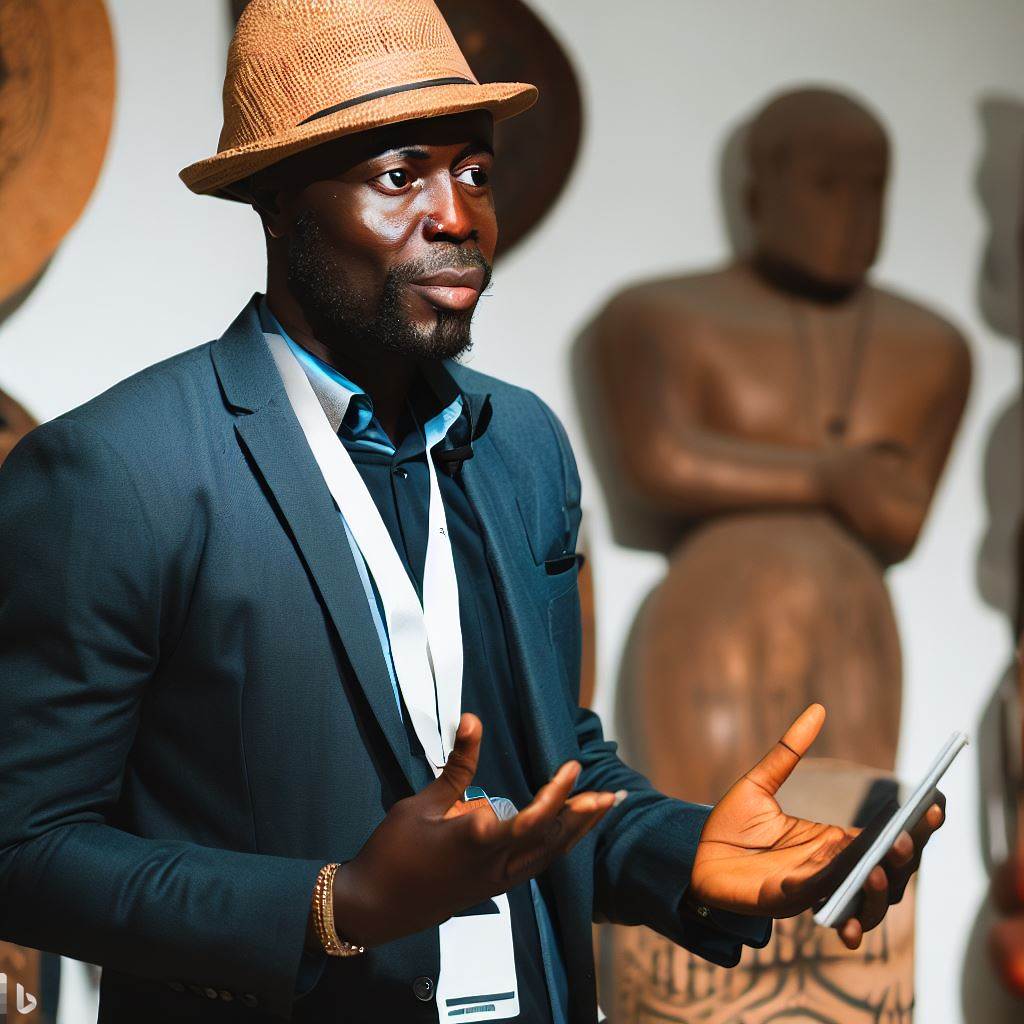Introduction
Digital curation refers to the process of collecting, organizing, and preserving digital content for future use.
In the modern era, digital curation plays a crucial role in managing the ever-increasing volume of digital information.
In the Nigerian context, digital curation is becoming increasingly important due to the country’s rapid digital transformation.
This blog post aims to explore how Nigeria is embracing digital curation while maintaining its traditional roots.
A. Digital Curation
Preserving Nigeria’s Cultural Heritage in the Digital Age
As technology continues to evolve, so does the way we consume and preserve information.
Digital curation, the practice of collecting, organizing, and preserving digital content, has become a vital tool in this era of endless information.
In Nigeria, a country characterized by rich cultural traditions, digital curation has taken on a modern take.
B. Importance of digital curation in the modern era
This blog section will delve into the importance of digital curation in the Nigerian context and how it is enabling the preservation and promotion of Nigeria’s cultural heritage in the digital age.
Nigeria, with its vibrant cultural diversity and numerous tribes, is a goldmine of traditions and artifacts.
However, these treasures often face the risk of being lost or forgotten due to various factors, including poor preservation methods and lack of accessibility.
C. Overview of the Nigerian context
Digital curation plays a vital role in Nigeria, preserving cultural artifacts, historical documents, and traditional practices, making them accessible worldwide.
Furthermore, digital curation bridges tradition and modernity, using technology to showcase Nigeria’s cultural heritage globally and embracing the digital revolution.
Preserving traditions boosts tourism, promotes cultural exchange, and generates local economic opportunities.
D. Introduction to the main idea of the blog post
This blog post explores Nigeria’s digital curation initiatives, addresses challenges, and underscores its potential for preserving cultural heritage.
Stay tuned to discover how Nigeria is leveraging digital curation to take its traditions to new heights in the modern era.
Traditional Nigerian Cultural Heritage
Nigeria is renowned for its diverse and rich cultural heritage, which includes a wide array of traditional practices, beliefs, and artifacts.
This heritage is deeply rooted in the country’s history and plays a significant role in shaping its identity.
Traditional Nigerian cultural heritage encompasses various aspects, such as music, dance, folklore, costumes, and ceremonies.
These elements reflect the diversity of Nigeria’s ethnic groups, each with its unique traditions and customs.
From the Yoruba to the Hausa, Igbo to the Efik, numerous ethnic groups contribute to the tapestry of Nigerian culture.
A. Description of the rich cultural heritage in Nigeria
Nigeria’s rich cultural heritage is a tapestry of diverse traditions, customs, and artistic expressions.
Vibrant ethnic groups, such as the Yoruba, Igbo, and Hausa, contribute unique flavors to the nation’s cultural mosaic.
Each group boasts its own language, music, dance, and cuisine, celebrating their rich histories and identities.
Nigeria’s festivals, like the colorful Yoruba Osun-Osogbo festival, showcase intricate rituals, showcasing spiritual devotion and artistic prowess.
The country’s artistry shines through breathtaking sculptures, textiles, and paintings, with masterpieces like the Benin Bronzes renowned globally.
Nigerian music, from Afrobeat to Highlife, resonates worldwide, transcending borders and influencing global music trends.
Cuisine is an integral part of this cultural symphony, with dishes like jollof rice and suya tantalizing taste buds.
Nigeria’s cultural heritage is a testament to the nation’s resilience and creativity, a source of pride for its people and an enriching experience for visitors.
B. Traditional methods of preserving cultural artifacts
Maintaining the country’s identity and passing down traditions to future generations is paramount, achieved through preserving cultural heritage.
Traditional methods of preservation have been integral in safeguarding cultural artifacts and ensuring their longevity.
One of the primary ways Nigerian cultures preserve their heritage is through oral history and storytelling.
Elders in the community serve as custodians of knowledge, passing down stories, legends, and traditions through word of mouth.
Artisans use natural materials like clay, palm leaves, and animal skins to craft protective coverings for artifacts.
The protective coverings shield the artifacts from deterioration caused by environmental factors and pests.
One major challenge is the lack of resources and infrastructure to support proper artifact preservation.
In many rural communities, where traditional practices prevail, essential preservation technologies and materials are lacking in access.
C. Introduction to the main idea of the blog post
The rapid pace of urbanization and globalization poses a threat to traditional Nigerian cultural heritage.
Western influences and modernization often overshadow traditional practices, leading to a gradual erosion of cultural identity.
The younger generation, increasingly exposed to foreign culture through media and technology, may be less inclined to embrace and preserve traditional practices.
Despite these challenges, efforts are being made to adapt traditional preservation methods to the digital age.
Digital curation, the process of managing, preserving, and showcasing digital cultural artifacts, offers new possibilities for safeguarding Nigerian cultural heritage.
Organizations and institutions are increasingly using digital platforms and technologies to document and share traditional practices, music, dance, and other aspects of Nigerian culture.
These digital archives serve as repositories of knowledge, accessible to a wider audience, including future generations.
Nigeria’s traditional cultural heritage is a treasure that needs to be protected and preserved.
Digital curation offers hope in preserving Nigerian cultural artifacts for future generations, overcoming challenges posed to traditional methods.
By embracing both tradition and technology, Nigeria can ensure that its rich cultural heritage thrives in the digital age.
The Emergence of Digital Curation
Digital curation refers to the process of collecting, organizing, and preserving digital content.
It involves the management and preservation of digital assets, ensuring their long-term accessibility and usability.
When it comes to cultural artifacts, digitizing them means converting physical objects such as artworks, manuscripts, photographs, and historical documents into digital formats.
This process allows for their preservation and wider accessibility.
Benefits of Digitizing Cultural Heritage
- Preservation: Digitizing cultural artifacts helps in preserving them for future generations.
Physical objects can deteriorate over time due to factors like aging, climate conditions, or accidents. By creating digital copies, these artifacts can be protected from potential damage or loss. - Accessibility: Digitization enhances the accessibility of cultural heritage. With digital platforms, people can access and explore cultural artifacts from anywhere in the world, without the need for physical presence.
- Increased Engagement: Digital curation enables interactive experiences with cultural artifacts. Online platforms provide opportunities for virtual exhibitions, interactive storytelling, and multimedia presentations.
- Conservation: By digitizing cultural artifacts, conservation efforts can be supported. Digital copies can be shared with experts and scholars, enabling collaborative research and analysis.
- Cultural Repatriation: Digitization plays a vital role in repatriating cultural artifacts to their places of origin.
- Data Analysis and Research: Digital curation facilitates data analysis and research on cultural artifacts.
Digital collections can be analyzed using computational methods, leading to new insights and discoveries. Researchers can uncover hidden patterns, connections, and historical information. - Cultural Revitalization: Through digitization, traditional cultural practices and knowledge can be preserved and revitalized.
- Economic Opportunities: Digital curation creates economic opportunities around cultural artifacts.
Online platforms allow for the commercialization of digital content, generating revenue for cultural institutions and artists. - Collaboration and Sharing: Digital curation encourages collaboration and sharing among cultural institutions and individuals.
Digital platforms enable the exchange of resources, knowledge, and expertise, fostering cross-cultural collaborations and partnerships. - Adaptation to Modern Technology: Embracing digital curation allows cultural institutions to adapt to the digital age.
Digital curation has emerged as a modern approach to preserving and promoting cultural heritage.
Digitizing cultural artifacts offers numerous benefits, including preservation, accessibility, engagement, conservation, and economic opportunities.
Read: Skills Needed to Thrive as a Promotions Manager in Nigeria
Digital Curation in Nigeria: A Modern Take on Tradition
A. Overview of the current state of digital curation in Nigeria
Digital curation in Nigeria is still in its early stages, with limited infrastructure and awareness.
However, there has been a recent surge in interest and initiatives to preserve Nigeria’s cultural heritage digitally.
B. Existing initiatives and organizations involved in digital curation
The National Archives of Nigeria is one of the key organizations involved in digital curation.
They have been working on digitizing historical documents and photographs to ensure their preservation and accessibility.
The Nigerian Digital Preservation Network (NDPN) is another initiative that aims to collaborate with institutions and individuals to enhance digital curation practices.
Several universities in Nigeria also have digital libraries and repositories that focus on curating and preserving digital materials.
C. Examples of successful digitization projects in Nigeria
The Ancient Nok Terracotta Project is a notable example of a successful digitization project in Nigeria.
It involved the digital documentation of the ancient Nok terracotta sculptures, ensuring their long-term preservation and study.
The Nigerian Film Corporation has also undertaken digitization efforts to preserve and provide access to Nigeria’s rich film heritage.
Digital versions of classic Nigerian films are now available online, reaching a wider audience.
The “Digitization of Nigerian Languages Project” is another significant initiative that focuses on preserving Nigeria’s linguistic heritage through digital means.
This project involves the digitization and archiving of audio recordings of Nigerian languages, ensuring their future study and documentation.
while digital curation in Nigeria is still developing, there are promising initiatives and organizations dedicated to preserving and promoting Nigeria’s cultural heritage.
Through digitization projects, important historical documents, artifacts, films, and languages are being safeguarded for future generations to explore and learn from.
Read: The Future of the Insurance Agent Profession in Nigeria: Trends

Preservation and Accessibility
In the digital age, the importance of preserving cultural artifacts through digital curation cannot be overstated.
Digital curation is a modern approach that combines traditional methods with advanced technology to safeguard our cultural heritage for future generations.
A. Importance of preserving cultural artifacts through digital curation
- Protection from physical deterioration: Digital curation ensures the longevity of cultural artifacts by safeguarding them from the effects of time, decay, and other physical threats.
- Preservation of intangible cultural heritage: Digital curation allows for the preservation of intangible cultural heritage, such as traditional music, storytelling, and rituals, which would otherwise be lost.
- Documentation of historical significance: Cultural artifacts hold historical significance and provide insights into the past. Through digital curation, these artifacts can be documented and studied extensively.
- Prevention of loss due to disasters: Digital preservation provides a backup of cultural artifacts, reducing the risk of loss due to natural disasters or human-made catastrophes.
- Facilitation of research and education: Preserving cultural artifacts digitally ensures that researchers, educators, and students have access to a vast repository of knowledge and resources.
B. Enhanced accessibility of cultural heritage to a wider audience
- Global reach: Digital curation breaks down geographical barriers, allowing people from around the world to access and appreciate Nigeria’s rich cultural heritage.
- Increased inclusivity: Digital curation promotes inclusivity by making cultural artifacts accessible to individuals with disabilities or limited mobility.
- Revitalization of cultural practices: By digitizing cultural artifacts, communities can revive and celebrate their traditions, contributing to cultural continuity and identity.
- Engagement of younger generations: Digital platforms provide interactive and engaging ways for younger generations to connect with their cultural heritage.
- Promotion of tourism and economic opportunities: Increased accessibility to cultural heritage attracts tourists and creates opportunities for cultural tourism, thereby boosting economic growth.
C. The role of digital curation in preserving endangered artifacts
- Safeguarding threatened artifacts: Digital curation offers a solution to protect endangered artifacts, such as deteriorating manuscripts or vulnerable artistic creations.
- Virtual restoration and reconstruction: Digital curation virtually restores damaged artifacts, enabling people to appreciate their beauty and cultural significance.
- Archiving for future generations: Digital curation ensures that future generations have access to artifacts that might no longer exist physically.
- Sharing indigenous knowledge: Digital curation allows communities to share their indigenous knowledge and practices, preserving their heritage and promoting cultural diversity.
- Collaborative preservation efforts: Digital curation facilitates collaboration among institutions, researchers, and communities in preserving and sharing cultural artifacts.
Digital curation plays a vital role in both the preservation and accessibility of Nigeria’s cultural heritage.
Digital preservation protects cultural artifacts, while improved accessibility lets a broader audience appreciate and study these treasures.
Moreover, digital curation serves as a means to protect endangered artifacts and promote the cultural traditions that define Nigeria’s identity.
Read: Challenges of Working as an Insurance Agent in Nigeria Today
Delve into the Subject: Opportunities in Event Management: Nigeria’s Scope
Challenges and Solutions
A. Identification of challenges faced in implementing digital curation in Nigeria
- Limited awareness: Many people in Nigeria lack knowledge about digital curation and its benefits.
- Inadequate funding: Insufficient financial support hinders the development of digital curation initiatives.
- Skill gap: There is a scarcity of qualified professionals with expertise in digital curation.
- Content quantity: The sheer volume of digital content poses a challenge in managing and curating it effectively.
- Legal and ethical concerns: Issues regarding copyright, intellectual property rights, and privacy need to be addressed.
B. Lack of infrastructure and technological resources
- Inadequate internet connectivity: Slow and unstable internet connections limit access to digital resources.
- Limited hardware: Insufficient availability of computers and other necessary technological devices.
- Power supply issues: Frequent power outages disrupt digital curation activities and cause data loss.
C. Solutions and strategies to address these challenges
- Awareness campaigns: Educating the public about digital curation’s importance and benefits.
- Increased funding: Governments and organizations should allocate more funds to support digital curation initiatives.
- Training programs: Establishing training programs to develop a skilled workforce in digital curation.
- Collaboration: Creating partnerships between institutions, organizations, and professionals to share resources and knowledge.
- Metadata standards: Implementing standardized metadata practices to enhance discoverability and usability of digital content.
- Copyright guidelines: Developing clear guidelines to navigate legal and ethical challenges associated with digital curation.
- Mobile-based solutions: Leveraging the widespread use of mobile devices to overcome infrastructure limitations.
- Renewable energy: Exploring alternative power sources such as solar energy to mitigate power supply issues.
By addressing these challenges and adopting the recommended solutions, Nigeria can embrace digital curation and leverage its benefits
- Preservation of cultural heritage: Digital curation allows Nigeria to preserve and showcase its rich cultural heritage to the world.
- Economic growth: Effective digital curation can attract tourists and researchers, contributing to economic growth.
- Knowledge dissemination: Digital curation facilitates the sharing of knowledge and research findings across borders.
- Access to education: By curating digital educational resources, Nigeria can enhance access to quality education for all.
- Empowerment of local communities: Digital curation can empower local communities, giving them a platform to share their stories.
Nigeria faces various challenges in implementing digital curation, including limited awareness, lack of infrastructure, and skill gaps.
However, overcoming these challenges is possible with targeted strategies and solutions.
Embracing digital curation will bring numerous benefits to Nigeria, from preserving its cultural heritage to driving economic growth and empowering local communities.
It is crucial for Nigeria to prioritize digital curation and invest in the necessary resources and training to unlock its full potential.
Read: Skills You Need to Be a Successful Insurance Agent in Nigeria
The Impact of Digital Curation on Nigerian Tradition
A. How digital curation can strengthen Nigerian cultural identity
- Digital curation provides a platform for showcasing and preserving Nigeria’s rich cultural heritage.
- By utilizing digital platforms, Nigeria can reach a wider audience and engage them in its cultural traditions.
- Through digital curation, Nigerian cultural artifacts, music, dance, and literature can be preserved and shared.
- This preservation of cultural identity contributes to a stronger sense of pride among Nigerians.
- Online exhibitions and virtual tours allow individuals from all over the world to experience Nigerian traditions.
B. Increased awareness and appreciation of Nigerian heritage globally
- Digital curation exposes the world to the diverse cultural heritage of Nigeria.
- Virtual platforms create opportunities for international collaborations and exchanges centered around Nigerian traditions.
- Increased awareness of Nigerian heritage leads to a deeper appreciation and respect for its cultural diversity.
- Through digital curation, Nigeria can combat negative stereotypes and present a more accurate representation of its traditions.
- Improved international understanding of Nigerian culture fosters cultural diplomacy and cross-cultural dialogue.
C. Empowerment of local communities through digital curation initiatives
- Digital curation enables local communities to take ownership of their cultural heritage.
- Through online platforms, local artisans and craftsmen can showcase their skills and connect with wider markets.
- Increased visibility and recognition for local artisans can lead to economic opportunities and sustainability.
- By participating in digital curation, young Nigerians are inspired to learn and carry on traditional practices.
- Through digital curation, Nigeria can bridge the digital divide and ensure equal representation of all cultural groups.
Digital curation has a significant impact on Nigerian tradition by strengthening cultural identity, increasing global awareness and appreciation, and empowering local communities.
The use of digital platforms allows for the preservation and sharing of Nigerian cultural heritage, reaching a wider audience, and fostering international collaborations.
Digital curation initiatives create economic opportunities for local artisans and preserve traditional practices for future generations.
Embracing and leveraging digital curation is crucial in ensuring the continuity and vitality of Nigerian tradition in a modern world.
Explore Further: Nigeria’s Top Customer Service Events & Conferences 2023
Conclusion
This blog post has highlighted the importance of digital curation in Nigeria and its potential for preserving and showcasing Nigerian cultural heritage.
We discussed how digital curation enables the modernization of traditional practices, allowing for easier access to and preservation of cultural artifacts.
A. Recap of the main points discussed in the blog post
We explored how digital platforms reach a global audience and promote Nigerian cultural heritage effectively.
Digital curation significantly safeguards Nigeria’s diverse cultural heritage, preventing its loss or forgetfulness over time.
By digitizing and curating traditional artifacts, stories, and practices, we can ensure their longevity and pass them on to future generations.
B. Affirmation of the significance of digital curation in Nigeria
Looking ahead, the future of digital curation in Nigeria seems promising.
As technology continues to advance, we can expect more innovative tools and techniques for digital preservation and curation.
It will further boost accessibility and raise the visibility of Nigeria’s cultural heritage.
C. Future of digital curation in Nigeria and its potential for preserving and showcasing Nigerian cultural heritage.
Addressing challenges like the digital divide, infrastructure limitations, and the need for digital curation practice capacity building is crucial.
By investing in these areas, Nigeria can truly harness the power of digital curation to preserve and celebrate its rich cultural heritage.
For Nigeria, digital curation presents both an opportunity and a responsibility.
We celebrate traditions in a modern way, ensuring long-term preservation and global showcasing.




